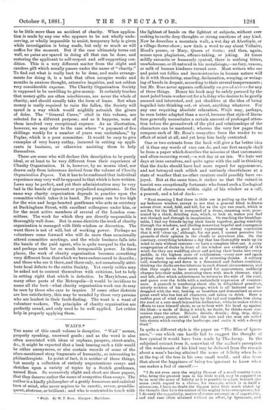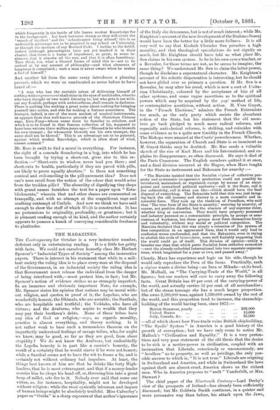WAIFS.* LIR name of this small volume is deceptive. "
Waif " means, properly speaking, unowned goods ; and as the word is also often associated with ideas of orphans, paupers, street-arabs, &c., it might be expected that a book bearing such a title would be either anonymous, or else contain records of some of the afore-mentioned stray fragments of humanity, so interesting to philanthropists. In point of fact, it is neither of these things, but merely a collection of entirely unpretentious essays and sketches upon a variety of topics by a Scotch gentleman, named Ross. So excessively slight and short are these papers, that they deserve rather the name of essayettes than essays. The author is a kindly philosopher of a gently humorous and satirical turn of mind, who never aspires to be caustic, severe, grandilo- quent, abstruse, or brilliant ; and who is contented to touch with
• Waifs. By W. T. Ross. Glasgow; Maelehose. the lightest of hands on the lightest of subjects, without ever seeking to excite deep thoughts or strong emotions of any kind. Now he describes a mountain walk, a wet day at Aberfoyle, or a village flower-show ; now finds a word to say about Voltaire,. Hood's poems, or Mary, Queen of Scots ; and then, again, muses upon plagiarism, offence-taking, or joking. At times mildly sarcastic or humanely cynical, there is nothing bitter,. unwholesome, or ill-natured in his moralisiugs,— no fury, venom, or milk of human kindness turned sour. Most writers who see and point out follies and inconsistencies in human nature will do it with thundering, snarling, declamation, weeping, or wring- ing of hands in despair, according to their several temperaments ; but Mr. Ross never appears sufficiently au grand serieme for any of these things. Hence his book may be safely perused by the most jaded brain-worker out for a holiday who desires to be gently amused and interested, and yet shudders at the idea of being beguiled into thinking out, or about, anything whatever. For any one requiring absolute relaxation, Waifs may, perhaps, be even better adapted than a novel, because that style of litera- ture generally necessitates a certain amount of prolonged atten- tion before the groundwork of the plot and relationships of the characters can be mastered ; whereas the very few pages that compose each of Mr. Ross's essayettes force the reader to no effort of mind at all, and yet keep him lazily contented.
One or two extracts from the book will give a far better idea of it than any words of ours can do, and our first sample shall; be from a paper which describes the miseries of that unromantic and often-recurring event,—a wet day at an inn. We hate wet days at inns ourselves, and quite agree with the calf in thinking that the ducks should have had more regard for appearances, and not betrayed such selfish and untimely cheerfulness at a state of weather that no- other creature could possibly have en- joyed.. But at the same time, it strikes us that the rained-in
tourist was exceptionally fortunate who found such a Zoological Gardens of observation within sight of his window as a calf, a peacock, and a lot of ducks :— "Next morning I find there is little use in pulling up the blind of my bedroom window, except to see that a general blind is drawn. across river, wood, field, and hill, far as the eye can reach, which is not far, for the blind is composed of a dense, steaming mist, pene- trated by a thick, drizzling rain, which, to look at, makes you fed wet through and through in imagination. On reaching the breakfast- table, I find my friends laying their heads together, gazing wistfully through the windows, and (feeling somewhat hopeful and courageous in the prospect of a good meal) expressing a strong conviction that it will clear up,' although, for my part, I cannot perceive the grounds of their opinion in the clouds or anywhere else. On the contrary, everything betokens a day that has thoroughly made up its mind to rain without remorse—to have a complete blow-oat. A noisy congregation of ducks in front of the window are evidently of this mind, for they are waddling about and poking their beaks into every puddle, in the highest state of exhilaration—every now and again jerking their heads cloudwards as if returning thanks. A solitary calf, wandering up and down in a demented and forlorn condition,. thinking the ducks are too hilarious ia such dismal circumstances, and that they ought to have more regard for appearances, suddenly charges into their midst, scattering them with much clamour, right and left, after which achievement he retires to the side of the road, and gazes over the fields with a melancholy expression of counten- ance. A peacock is wandering about also in dilapidated grandeur, utterly reckless of his fine plumage, which is all battered and be- draggled with the wet, looking as heartless and demoralised as some- great swell who has lost all character, and taken to drink. Here a sudden gust of wind catches him by the tail and trundles him along the road at a rate much beyond his inclination, while he makes violent efforts to tarn himself about, so as to bear with his head up against the blast—a mode of doing it which, no doubt, he thinks more con- venient than the other. Drizzle, drizzle, drizzle ; drip, drip, drip ; patter, patter, patter, swish ! and the ruin and the mist are rolled into sheets which envelop the landscape, and smite it with a dreary thud."
In quite a different style is the paper on "The Bliss of Ignor- ance,"— one which can hardly fail to suggest the thought of how cynical it would have been made by Thackeray. In the subjoined extract from it, somewhat of the author's perception
of the weaknesses of his kind may be deduced from the remark about a man's having attained the acme of felicity when he is at the top of the tree in his own small world ; and also from that about the happiness of being too ignorant to know when
one makes a fool of oneself :—
" I do not even envy the mighty Provost of a small country town who, being the greatest man in his little world, may be supposed to be as near the acme of felicity as it is possible to attain beneath tiger moon (with regard to a cheese, for example, %%hid' is in itself a microcosm, I have no doubt the biggest mite feels much elated by the thought that he is the mitiest of the mighty in his own sphere), but I do envy the equanimity, matter-of-course assumption of sapericrity, and cool ease often attained without an effort, by Ignorance, and which frequently in the battle of life leaves modest Knowledge far in the background. Let hack lecturers stump as they will about the march of intellect' and the schoolmaster being abroad,' this is an undeniable advantage not to be acquired in any school or University, or through the medium of any Revised Code. I incline to the belief, indeed (although phrenologists have not yet marked it in their charts), that there is a bump of impudence, so great, in some in- stances, that it absorbs all the rest, and that it is often hereditary. Then think, too, what a blessed frame of mind this is—not to be arrived at by any amount of philosophy—and what elements of happiness it compriseth ; such a man is never aware when he makes a fool of himself."
And another bit from the same essay introduces a pleasing proverb, which we were so uneducated as never before to have heard of :—
"A man who has the enviable talent of delivering himself of nothing with empressentent shall shine in the eyes of multitudes, when he who has a thought or two worth listening to, but who gets it out with. out any flourish, perhaps with awkwardness, shall remain in darkness. There is nothing like making a great noise about nothing for bringing yourself into notice, and also for making a fortune sometimes. The trumpet, indeed, is one of the most ancient of musical instruments, as appears from that well-known proverb of the illustrious Chinese sage, Kien-Fung—whose name must be familiar to scholars, and which is to be found in that famous collection of his, supposed to have been written three million years ago—' Blessed is he who bloweth his own trumpet ; for whosoever bloweth not his own trumpet, the same shall not be blowed.' This is an advantage not to be gainsaid, against which modest Knowledge, which is often short of wind, cannot contend."
Mr. Ross is swift to find a moral in everything. For instance, the sight of a comrade floundering in a bog, into which he has been brought by trying a short-cut, gives rise to this re- flection :—" Short-cuts to wisdom never lead you there ; and short-cuts to health, particularly if they are paved With pills, are likely to prove equally abortive." Is there not something comical and evil-smelling in the pill-pavement idea? Does not one's nose recoil from the notion of the odour that would arise from the trodden pills ? The absurdity of dignifying tiny shops with grand names furnishes the text for a paper upon "Esta- blishments," wherein that and other shams are commented on tranquilly, and with no attempt at the magnificent rage and scathing contempt of Carlyle. And now we think we have said enough to show the stuff of which Waifs is constructed. It has no pretensions to originality, profundity, or greatness ; but it is pleasant reading enough of its kind, and the author certainly appears to possess a knack of conveying considerable freshness to platitudes.































 Previous page
Previous page